News archive 2015
 Injury research influences UK sports strategy
Injury research influences UK sports strategy23 December 2015
Research and lobbying undertaken by public health experts at Queen Mary University of London (QMUL) has helped change the UK government’s sports strategy.
 Fortifying flour with folic acid could have prevented 2,000 UK birth defects
Fortifying flour with folic acid could have prevented 2,000 UK birth defects22 December 2015
The UK’s failure to fortify flour with folic acid has caused around 2,000 avoidable cases of neural tube defects since 1998, according to research led by Queen Mary University of London (QMUL).
 £10m grant awarded for Barts Heart Centre
£10m grant awarded for Barts Heart Centre22 December 2015
Queen Mary University of London (QMUL) and Barts Health NHS Trust have received £10 million from Barts Charity for the creation of a world-class cardiovascular academic medical centre at the Trust’s Barts Heart Centre, St Bartholomew’s Hospital.
.jpg) New generation of synthetic bone grafts created
New generation of synthetic bone grafts created18 December 2015
Scientists led by Queen Mary University of London (QMUL) have developed a new type of synthetic bone graft that boosts the body’s own ability to regenerate bone tissue and could produce better outcomes for patients.
 Phytoplankton like it hot: Warming boosts biodiversity and photosynthesis in phytoplankton
Phytoplankton like it hot: Warming boosts biodiversity and photosynthesis in phytoplankton17 December 2015
Warmer temperatures increase biodiversity and photosynthesis in phytoplankton, researchers at the Queen Mary University of London (QMUL) and University of Exeter have found. Globally, phytoplankton - microscopic water-borne plants - absorb as much carbon dioxide as tropical rainforests and so understanding the way they respond to a warming climate is crucial.
11 December 2015
Dr Mehrnoosh Sadrzadeh from QMUL's School of Electronic Engineering and Computer Science looks at what it takes to teach an AI how to read natural human languages.
 QMUL’s Institute of Bioengineering launch celebrated with photo competition
QMUL’s Institute of Bioengineering launch celebrated with photo competition11 December 2015
The new cross-faculty Institute of Bioengineering at Queen Mary University of London (QMUL) celebrated its launch with a photo competition for staff and students.
 Drug provides another treatment option for an early form of breast cancer
Drug provides another treatment option for an early form of breast cancer11 December 2015
The drug anastrozole is effective in treating an early form of breast cancer, according to a clinical trial led by Queen Mary University of London (QMUL).
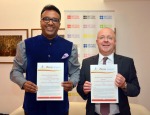 Queen Mary University of London, O. P. Jindal Global University sign MoU on South Asia research university network
Queen Mary University of London, O. P. Jindal Global University sign MoU on South Asia research university network11 December 2015
Queen Mary University of London (QMUL) and O. P. Jindal Global University (JGU) have signed a Memorandum of Understanding (MoU) to facilitate collaboration between emergent research universities in South Asia for teaching, academic and research activities.
 People’s Palace Projects co-produce acclaimed homelessness arts project in São Paulo
People’s Palace Projects co-produce acclaimed homelessness arts project in São Paulo10 December 2015
With One Voice, an international arts programme designed to give homeless people in host cities a voice during the Olympics will be launched in São Paulo, Brazil on Saturday 12 December.
 Breast screening programme effective in preventing some invasive cancers
Breast screening programme effective in preventing some invasive cancers8 December 2015
Screening for and treatment of an early form of breast cancer has been found to prevent subsequent invasive cancer, according to research led by Queen Mary University of London (QMUL).
-150x115.jpg) Blizard Institute marks 10 year anniversary
Blizard Institute marks 10 year anniversary4 December 2015
Queen Mary University of London’s (QMUL) world-class research centre, the Blizard Institute, is celebrating its tenth year.
 Tony Hall calls for external regulator to guarantee BBC independence
Tony Hall calls for external regulator to guarantee BBC independence3 December 2015
The BBC's director general Lord Tony Hall has repeated his calls for an external regulator for the corporation, arguing for regulation that is “effective, not prescriptive”. He made the remarks as he opened a discussion on “Re-imagining the BBC: Charters Past and Present”, organised by the Mile End Institute and the BBC on 2 December.
 Professor Michael Kenny wins WJM MacKenzie Prize
Professor Michael Kenny wins WJM MacKenzie Prize2 December 2015
Professor Michael Kenny, Director of QMUL’s Mile End Institute, has won the prestigious W.J.M Mackenzie Prize for his book The Politics of English Nationhood. The prize is awarded annually by the UK’s Political Studies Association (PSA) for the best book published in political science.
 New grants for pancreatic cancer research
New grants for pancreatic cancer research27 November 2015
Queen Mary University of London (QMUL) has received new grants from Pancreatic Cancer UK (PCUK) to fund five projects that aim to improve treatment options for pancreatic cancer patients.
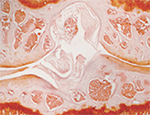 New strategy discovered for treating arthritis
New strategy discovered for treating arthritis26 November 2015
Arthritis patients could one day benefit from a novel form of medicine, according to researchers at Queen Mary University of London (QMUL). Their early study indicates that arthritic cartilage, previously thought to be impenetrable to therapies, could be treated by a patient’s own ‘microvesicles’ that are able to travel into cartilage cells and deliver therapeutic agents.
 QMUL professor wins £300,000 research prize to help transform satellite and mobile communications
QMUL professor wins £300,000 research prize to help transform satellite and mobile communications25 November 2015
A world expert in antennae and electromagnetics from Queen Mary University of London (QMUL) has been awarded a prestigious £300,000 international prize from the Institution of Engineering and Technology (IET).
 ‘Poo Racer’ video game to flush away bowel taboos
‘Poo Racer’ video game to flush away bowel taboos25 November 2015
A poo racing video game which aims to change attitudes towards defecation and bowel health has been launched by Queen Mary University of London (QMUL). A second new game, Gene Quest, has also been created to encourage interest in one of the world’s largest genetics studies.
 Award for outstanding use of information in MS care
Award for outstanding use of information in MS care18 November 2015
Professor Gavin Giovannoni and Alison Thomson from the Barts MS Research team at Queen Mary University of London (QMUL) have received an award for outstanding use of information in multiple sclerosis (MS) care.
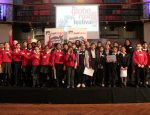 Young poets celebrated at QMUL’s Globe Road Poetry Festival
Young poets celebrated at QMUL’s Globe Road Poetry Festival18 November 2015
Loving mums, sly scorpions, and ‘rolling rocks on your fingers’ were among the eclectic images explored by more than 120 young poets at QMUL’s Globe Road Poetry Festival.
 QMUL set to premiere piece of music based on renowned east London First World War poet
QMUL set to premiere piece of music based on renowned east London First World War poet18 November 2015
A piece of music based on the work of First World War poet Isaac Rosenberg, who grew up in east London, is to premiere at Queen Mary University of London (QMUL).
 Male bees have more than a one-track mind
Male bees have more than a one-track mind16 November 2015
Male bumblebees are just as smart as female worker bees despite their dim-witted reputation, according to new research from Queen Mary University of London (QMUL).
 Amrita Ahluwalia awarded Women in Science and Engineering prize
Amrita Ahluwalia awarded Women in Science and Engineering prize16 November 2015
Professor Amrita Ahluwalia from Queen Mary University of London (QMUL) has been awarded the 2015 Prize for Research by the WISE (Women in Science and Engineering) Campaign.
 Psychiatric assessments for predicting violence are ineffective
Psychiatric assessments for predicting violence are ineffective11 November 2015
Standard approaches for investigating risk of violence in psychiatric patients and prisoners are inaccurate and should be abandoned in all future studies, according to researchers from Queen Mary University of London (QMUL).
 QMUL celebrates the humanities with festival of events
QMUL celebrates the humanities with festival of events11 November 2015
From philosophy in pubs, history in coffeehouses, classics on social media and language lessons on street corners – Queen Mary University of London (QMUL) is set to host a programme of events for the Being Human festival of the humanities.
 Deal with EU could come as early as December, says Europe minister
Deal with EU could come as early as December, says Europe minister10 November 2015
Europe minister David Lidington has said the government hopes to arrive at a deal with the European Union as early as December, but cautioned that it was too early to guarantee exact timings. He made the remarks at a keynote speech at the “Britain and Europe: The Lessons from History” conference, organised by Queen Mary University of London (QMUL)’s Mile End Institute (MEI) on 9 November.
 Watching cement dry could help dental fillings last longer
Watching cement dry could help dental fillings last longer9 November 2015
Scientists led by Queen Mary University of London (QMUL) and Aberystwyth University have revealed ‘sweet points’ for dental fillings, where cement used to fill cracks regain elasticity before hardening indefinitely. This could have implications for creating more durable and longer-lasting fillings in the future.
 £8 million awarded for pancreatic cancer research ‘dream team’
£8 million awarded for pancreatic cancer research ‘dream team’9 November 2015
A trans-Atlantic ‘dream team’, involving scientists and clinicians from Queen Mary University of London (QMUL), has been awarded £8 million to fight pancreatic cancer.
 Football Community Cup hosted by Queen Mary FC
Football Community Cup hosted by Queen Mary FC9 November 2015
Queen Mary Football Club (QMFC) hosted a 7-a-side football tournament for five schools in Tower Hamlets to offer youngsters a chance to ask students about university life and education.
 Possessive jealousy and femicide take centre stage at performance of Othello on Trial
Possessive jealousy and femicide take centre stage at performance of Othello on Trial6 November 2015
Possessive jealousy, rage, and murder; it’s is a story as old as Othello. Two women are killed by male partners each week on average in the UK. In November, a series of performances at Queen Mary University of London - sponsored by the School of Law and the Centre for Public Engagement - adapted Shakespeare’s masterpiece to stimulate debate about the high level of male violence against women in modern Britain.
 Celebrities, The Royal Family, privacy, and the law
Celebrities, The Royal Family, privacy, and the law4 November 2015
In this post, Professor Robin Callender Smith from QMUL's School of Law, discusses his forthcoming book on celebrities and privacy law.
 ‘Nowhere People’ and the stories of the world’s stateless
‘Nowhere People’ and the stories of the world’s stateless4 November 2015
More than 10 million people across the globe are not recognised by any country, and are stateless. Nowhere People an acclaimed new book by photojournalist and QMUL Distinguished Fellow Greg Constantine, tells the stories of people and communities who have been denied their identity, and stripped of the most basic aspects of citizenship.
 Season of Bangla Drama returns to QMUL
Season of Bangla Drama returns to QMUL3 November 2015
Gender, identity and power are among the themes that will be explored by the 13th Season of Bangla Drama festival, which returns to Queen Mary University of London (QMUL) this November.
 Campaigns of violence towards Rohingya are highly organised and genocidal in intent
Campaigns of violence towards Rohingya are highly organised and genocidal in intent29 October 2015
Persecution of the Rohingya minority in Myanmar has been orchestrated by the government, state-level officials and Buddhist monks, according to the findings of an 18-month investigation into state crime.
 Long-term benefits of chronic fatigue therapies
Long-term benefits of chronic fatigue therapies28 October 2015
Cognitive behavioural therapy and graded exercise therapy could have long term benefits for people affected by Chronic Fatigue Syndrome, according to research by Queen Mary University of London (QMUL), Oxford University and King’s College London.
 QMUL project shortlisted for “Oscars of higher education”
QMUL project shortlisted for “Oscars of higher education”28 October 2015
InQUBEate, a QMUL student enterprise programme that provides mentoring and training for students with entrepreneurial ideas, has been shortlisted for the Wharton-QS Stars Reimagine Education Awards 2015.
 Manipulating the antennae on cells promises new treatments for osteoarthritis
Manipulating the antennae on cells promises new treatments for osteoarthritis27 October 2015
Bioengineers from Queen Mary University of London (QMUL) have shown for the first time that lithium chloride, a common drug used to treat mental health disorders, could offer an effective treatment against osteoarthritis by disrupting the length of the cells’ antennae called primary cilia.
 QMUL PhD student stumbles upon a new way for producing oldest chemical compounds
QMUL PhD student stumbles upon a new way for producing oldest chemical compounds27 October 2015
A chemistry PhD student has found a simple way for the first time of producing two chemical compounds that were first discovered in late 19th century, entirely by accident. The discovery could have implications for fighting disease and growing crops, where the sulfur containing compounds called sultones and sultines, play a significant role.
 London's Trauma System dramatically reduces mortality rates
London's Trauma System dramatically reduces mortality rates27 October 2015
The London Trauma System has greatly increased quality of care for trauma patients, according to research from Queen Mary University of London (QMUL) and the London Regional Trauma System.
 QMUL launches Confucius Institute at Mile End campus
QMUL launches Confucius Institute at Mile End campus27 October 2015
Queen Mary University of London (QMUL) has officially launched its Confucius Institute, in partnership with Shanghai University of Finance and Economics (SUFE) and Hanban, the Chinese National Office for Teaching Chinese as a Foreign Language, which is responsible for promoting Chinese language and culture abroad.
 England rugby great Jason Leonard attends school tournament hosted by QMUL
England rugby great Jason Leonard attends school tournament hosted by QMUL26 October 2015
Rugby World Cup winner Jason Leonard paid a visit to Queen Mary RFC’s Tower Hamlets Schools Tag Tournament which was set up to encourage school kids across the borough to play rugby.
 Collagen’s role in skin cancer
Collagen’s role in skin cancer22 October 2015
Collagen has been found to play a role in suppression of blood vessel formation in a type of skin cancer, according to research led by Queen Mary University of London (QMUL). The results suggest that type VII collagen could help suppress tumour formation in the skin.
 QMUL begins major research project to document Europe’s migration crisis
QMUL begins major research project to document Europe’s migration crisis21 October 2015
Researchers from Queen Mary University of London (QMUL) will this week begin work on a major project to document Europe’s migrant and refugee crisis. Led by Professor Elspeth Guild from QMUL’s School of Law, the research team will produce a database of migrant journeys as well as testimonies from interviews with migrants and refugees.
 Ragged Children, Mended Lives: the stories of East London’s 19th century children
Ragged Children, Mended Lives: the stories of East London’s 19th century children21 October 2015
In 1877, the few square miles around where Queen Mary University of London stands today was one of the most densely populated places on earth. In a then squalid corner of London, more than a million people – many of them desperately poor – faced hunger, unemployment, and disease.
 Clinical trial shows first ever positive results in treating primary progressive and relapsing multiple sclerosis
Clinical trial shows first ever positive results in treating primary progressive and relapsing multiple sclerosis20 October 2015
QMUL researchers’ study shows positive results when treating both primary progressive and relapsing remitting multiple sclerosis with the drug ocrelizumab.
 Professor Steve Thornton appointed as Vice Principal (Health)
Professor Steve Thornton appointed as Vice Principal (Health)15 October 2015
QMUL has announced the appointment of Professor Steve Thornton as Vice Principal (Health) and Executive Dean of the Barts and the London School of Medicine and Dentistry. Professor Thornton joins QMUL from the University of Exeter and will take up his post from January 2015.
 East London Genes and Health celebrates 4,000th study participant
East London Genes and Health celebrates 4,000th study participant14 October 2015
East London Genes & Health, the world’s largest community based genetics study, is celebrating its first milestone with 4,000 local participants taking part so far.
 Ada Lovelace and the importance of role models
Ada Lovelace and the importance of role models13 October 2015
To celebrate Ada Lovelace Day 2015, Professor Elaine Chew from QMUL's School of Electronic Engineering and Computer Science argues about the importance of role models. After all, if computer pioneer Ada Lovelace had strong women role models even in her day, we must ensure women continue to do so today.
 ‘Messiah at London's Foundling Hospital’ nominated for an international Emmy
‘Messiah at London's Foundling Hospital’ nominated for an international Emmy13 October 2015
‘Messiah at London's Foundling Hospital’, a documentary that was co-developed and co-presented by QMUL’s Professor Amanda Vickery, has been nominated for an international Emmy.
 Researchers awarded £3.5m grant to improve prevention of tuberculosis (TB) in South African schoolchildren
Researchers awarded £3.5m grant to improve prevention of tuberculosis (TB) in South African schoolchildren12 October 2015
The Medical Research Council (MRC) has awarded a grant of £3.5m to researchers from Queen Mary University of London (QMUL) and University of Cape Town (UCT) to carry out a trial to determine whether a weekly vitamin D supplement can prevent tuberculosis (TB) in South African primary school children.
 Without treaty change Britain will vote to leave the European Union, says Lord Owen
Without treaty change Britain will vote to leave the European Union, says Lord Owen8 October 2015
The campaign to keep Britain in the EU will be defeated unless the government secures treaty change before the referendum, according to former Foreign Secretary Lord David Owen. He made his remarks as part of a major speech on referendums, at the Mile End Institute's Inaugural Hennessy Lecture.
8 October 2015
On National Poetry Day, Professor Andrea Brady – curator of the Globe Road Poetry Festival – has criticised the “structure of white privilege” in British poetry communities.
 The white privilege of British poetry is getting worse
The white privilege of British poetry is getting worse8 October 2015
Writing in The Conversation, Andrea Brady - Professor of Poetry at QMUL - criticises what she describes as the "structure of white privilege" in British poetry communities.
 QMUL researcher nominated for Women in Science and Engineering Award
QMUL researcher nominated for Women in Science and Engineering Award5 October 2015
Professor Amrita Ahluwalia has been nominated in the research category in the awards that recognise those who lead the way for women in science, technology, engineering and maths.
 Mobile miracles, trusting the under-30s and job creation - QMUL launches its Inaugural Lecture series
Mobile miracles, trusting the under-30s and job creation - QMUL launches its Inaugural Lecture series5 October 2015
How did scientists create the miracles behind the technology we take for granted, what problems did generational conflict pose in 1960s Germany and how can economists create better jobs?
 New study removes cancer doubt for Multiple sclerosis drug
New study removes cancer doubt for Multiple sclerosis drug1 October 2015
Researchers from Queen Mary University of London (QMUL) are calling on the medical community to reconsider developing a known drug to treat people with relapsing Multiple sclerosis (MS) after new evidence shows it does not increase the risk of cancer as previously thought.
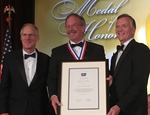 Professor Jack Cuzick receives American Cancer Society Medal of Honor
Professor Jack Cuzick receives American Cancer Society Medal of Honor1 October 2015
Leading QMUL cancer researcher Professor Jack Cuzick has been given a prestigious award for his contributions to clinical research.
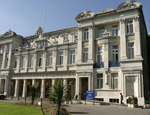 QMUL in top 100 universities in the world
QMUL in top 100 universities in the world1 October 2015
QMUL rose eight places in Times Higher Education World University Ranking to 98th in the world and is ranked 16th in the UK.
 Experts call for urgent reform of deprivation of liberty safeguards
Experts call for urgent reform of deprivation of liberty safeguards30 September 2015
The Deprivation of Liberty Safeguards – designed to protect the rights of the legally incapacitated – are a threat to human rights and require urgent reform, according to UK and international experts speaking at a conference convened by Queen Mary University of London.
 Self-assembling material that grows and changes shape could lead to artificial arteries
Self-assembling material that grows and changes shape could lead to artificial arteries28 September 2015
Researchers at QMUL have developed a way of assembling organic molecules into complex tubular tissue-like structures without the use of moulds or techniques like 3D printing.
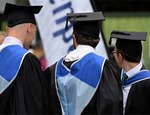
28 September 2015
One of the leading university guides has found that graduates from QMUL have one of the top average starting salaries of anyone in the UK.
 Barts Pathology Museum's technical curator wins Major Contribution to the Understanding of Death Award
Barts Pathology Museum's technical curator wins Major Contribution to the Understanding of Death Award25 September 2015
Carla Valentine, technical curator at Barts Pathology Museum, has won the Major Contribution to the Understanding of Death Award at the Good Funeral Awards 2015 thanks to her work engaging with the public.
 Labour is lost in England and must federalise, says Jon Cruddas MP
Labour is lost in England and must federalise, says Jon Cruddas MP23 September 2015
The Labour Party is lost in England and must federalise to survive, according to Jon Cruddas. The MP for Dagenham and Rainham was speaking at the Mile End Institute, Queen Mary University of London, where he called for an English Labour party to win back lost voters.
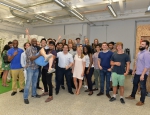 Budding student entrepreneurs pitch ideas at QMUL’s 3 Day Start-up event
Budding student entrepreneurs pitch ideas at QMUL’s 3 Day Start-up event22 September 2015
QMUL’s Careers and Enterprise Centre hosted their third 3 Day Start-up (3DS) boot camp over the summer which encouraged students to improve their entrepreneurial skills in the real world by developing companies over the course of three days.
 Fifty-year old drug is best in resistant hypertension
Fifty-year old drug is best in resistant hypertension21 September 2015
Researchers from QMUL, working with other institutions, have found that a diuretic drug that has been in use for over fifty years could be the most effective treatment for a particularly high risk form of high blood pressure.
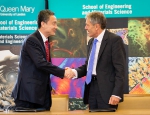 QMUL signs major strategic collaboration with China’s Northwestern Polytechnical University
QMUL signs major strategic collaboration with China’s Northwestern Polytechnical University21 September 2015
Queen Mary University of London (QMUL) has signed a major strategic collaboration agreement with Northwestern Polytechnical University (NPU), based in Xi’an, China, to develop teaching and research partnerships and faculty and student exchange, initially in the areas of Materials Science and Engineering.
 Study finds people’s conservative and liberal traits show up in their Twitter vocabulary
Study finds people’s conservative and liberal traits show up in their Twitter vocabulary16 September 2015
A study of nearly a million tweets from over 10,000 Twitter users has found that liberals swear more, conservatives are more likely to talk about religion, and liberals use more individual words like "me" while conservatives opt more for the group-oriented "us".
 Four QMUL researchers among the most influential one per cent in the world
Four QMUL researchers among the most influential one per cent in the world16 September 2015
Academics researching molecular biology and clinical medicine have been named on Thomson Reuter’s Highly Cited Researchers 2015 list which recognises the top one per cent most cited papers published between 2003 and 2013.
 Government praises QMUL’s support for school computing teachers
Government praises QMUL’s support for school computing teachers11 September 2015
Minister of State for Schools, Nick Gibb MP, has written to QMUL’s Principal, Professor Simon Gaskell, to thank him for the university’s contribution to the Network of Teaching Excellence in Computing Science supporting school teachers.
10 September 2015
A new study shows that pancreatic cancer stem cells (PancSCs) are virtually addicted to oxygen-based metabolism, and could be “suffocated” with a drug already used to treat diabetes.
 Robot poets, international names, slams and debate at the inaugural Globe Road Poetry Festival
Robot poets, international names, slams and debate at the inaugural Globe Road Poetry Festival10 September 2015
Some of the world’s best known international poets will perform in East London this November at the inaugural Globe Road Poetry Festival.
 England could eradicate Bovine TB if it adopted Welsh or Scottish tactics
England could eradicate Bovine TB if it adopted Welsh or Scottish tactics9 September 2015
New research by the team that previously showed that testing was more effective than badger culling at controlling Bovine Tuberculosis, have found the tactics currently employed by the Welsh and Scottish, but not English, authorities are leading to disease reduction.
 Understanding of complex networks could help unify gravity and quantum mechanics
Understanding of complex networks could help unify gravity and quantum mechanics9 September 2015
Mathematicians investigating one of science’s great questions – How to unite the physics of the very big with that of the very small – have discovered that when the understanding of complex networks such as the brain or the internet is applied to geometry the results match up with quantum behaviour.
 Social media and health: a source of “patient voices” or just business?
Social media and health: a source of “patient voices” or just business?8 September 2015
Why does NHS and government policy neglect and ignore the value of online patient communities? QMUL researchers Dr Nelya Koteyko and Dr Daniel Hunt investigated this question as part of a major study on social media and living with chronic illness.
4 September 2015
The textbook Medical Sciences 2nd Edition published by Elsevier has just won first prize in the British Medical Associations medical book awards in the category of Basic and clinical sciences. The book was edited by Dr Jeannette Naish from QMUL’s Wolfson Institute of Preventive Medicine and Dr Denise Syndercombe Court a QMUL honorary fellow.
 Olympian Kate Richardson-Walsh officially opens new dental outreach clinic in Stratford
Olympian Kate Richardson-Walsh officially opens new dental outreach clinic in Stratford4 September 2015
Queen Mary University of London (QMUL) and Barts Health NHS Trust are delighted to officially open their new dental outreach centre in Stratford, set in the heart of the Olympic Park.
 QMUL projects shortlisted for Times Higher Education Awards 2015
QMUL projects shortlisted for Times Higher Education Awards 20153 September 2015
Two QMUL projects have been shortlisted for the Times Higher Education Awards 2015 which are due to take place on 26 November.
 First imagery from echolocation reveals new signals for hunting bats
First imagery from echolocation reveals new signals for hunting bats1 September 2015
The ability of some bats to spot motionless prey in the dark has baffled experts until now. By creating the first visual images from echolocation, researchers reveal we have been missing how bats sense their world.
 Game on! Centre of the Cell holds its first game development workshop for young science communicators
Game on! Centre of the Cell holds its first game development workshop for young science communicators1 September 2015
Centre of the Cell opened its doors to a group of young Londoners to run a full day of game development activities. Twelve 14-18 year olds were invited to evaluate existing games, test new games in the making, and even come up with some game ideas of their own.
 Why the Chilcot inquiry has taken so long – and why we should wait to judge it
Why the Chilcot inquiry has taken so long – and why we should wait to judge it28 August 2015
The long running Chilcot inquiry has come under significant pressure to complete its work and publish its report. In this article, Dr James Ellison, Reader in International History at QMUL, explains why it's taken so long, and says: "In the end, we must judge the inquiry on its terms of reference and the rigour, accuracy, and fairness of its report".
 New approach to tackling uncontrolled high blood pressure shows significant results
New approach to tackling uncontrolled high blood pressure shows significant results27 August 2015
Scientists from Queen Mary University of London and Barts Health NHS Trust have successfully improved blood pressure control among patients with severe intolerance to antihypertensive medication – by using medicines in unconventional ways and treating patients with a ‘stepped care’ approach (where the most effective yet least intensive treatment is delivered to patients first).
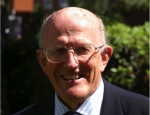 QMUL microwave pioneer to receive prestigious Sir Frank Whittle Medal
QMUL microwave pioneer to receive prestigious Sir Frank Whittle Medal26 August 2015
Internationally renowned British microwave engineer Professor Peter Clarricoats, who worked at QMUL for nearly 50 years, is to receive one of the Royal Academy of Engineering’s highest accolades, the Sir Frank Whittle Medal, for his influential achievements.
 QMUL historian shines a new light on the life and legacy of Edmund Burke
QMUL historian shines a new light on the life and legacy of Edmund Burke24 August 2015
A new book from acclaimed historian Professor Richard Bourke chronicles the extraordinary life of Edmund Burke (1730-97), a leading philosopher and statesman of the eighteenth century.
 High sugar consumption among children relates to poor family functioning, study finds
High sugar consumption among children relates to poor family functioning, study finds21 August 2015
The quality of general family functioning is a major determinant of healthy dietary habits – according to new research published in the Journal of Caries Research and led by Queen Mary University of London.
 QMUL announces free advice service for start-up businesses and entrepreneurs
QMUL announces free advice service for start-up businesses and entrepreneurs20 August 2015
Queen Mary University of London has announced details of a free business advice scheme for start-ups and entrepreneurs in London. Based at QMUL’s School of Economics and Finance, qNomics will provide expert consultancy to fledgling businesses in the financial and technological sectors.

19 August 2015
The Bangkok bomb killed 20 people, injured more than 100, and shook Thai politics, already turbulent, to its core. In this article, Dr Lee Jones, Senior Lecturer in Politics and International Relations, argues: until concrete evidence is produced, we should avoid any rush to judgement, and take both speculation and assignations of blame with a truckload of salt.
 Humanities researchers at QMUL awarded £1.6 million for major study on emotional health
Humanities researchers at QMUL awarded £1.6 million for major study on emotional health18 August 2015
What is the perfect recipe for 'emotional health', and who decides which emotions we should feel in order to be healthy? These are among the questions that will be explored by a team of researchers at QMUL’s Centre for the History of the Emotions, as part of a major new research programme funded by a Humanities and Social Science Collaborative Award from the Wellcome Trust.

18 August 2015
The crisis facing migrants on the shores of Europe shows no sign of abating. As EU member states prevaricate on how to manage a human and political crisis, Dr Jessica Jacobs from QMUL's School of Geography says: "The system is paralysed. To make it move again, hospitality is the key".
 Fallow deer are all about the bass when sizing up rivals
Fallow deer are all about the bass when sizing up rivals14 August 2015
Research published in the journal BMC Evolutionary Biology, has found that fallow deer bucks make judgements about the possible threat from competitors from the sound of their calls.
 Birdsong recognition app launches using QMUL research
Birdsong recognition app launches using QMUL research13 August 2015
QMUL machine learning researcher Dan Stowell and his business partner Florence Wilkinson have launched Warblr, their mobile app that can automatically recognise birds by their song.
 New study confirms listening to music during surgery reduces pain and anxiety
New study confirms listening to music during surgery reduces pain and anxiety13 August 2015
Scientists have proved that listening to music before, during and after surgery reduces people’s pain, anxiety and need for painkillers – according to the most comprehensive review of available evidence so far, published today in The Lancet.
 QMUL joint first in London for student satisfaction
QMUL joint first in London for student satisfaction11 August 2015
Overall student satisfaction at Queen Mary University of London has climbed to 88 per cent, up from 86 per cent in 2014. The results of the 2015 National Student Survey (NSS) ranks QMUL as joint first in London and in the top ten of Russell Group universities for student satisfaction.
 Urine test for early stage pancreatic cancer now possible after biomarker discovery
Urine test for early stage pancreatic cancer now possible after biomarker discovery3 August 2015
A combination of three proteins found at high levels in urine can accurately detect early-stage pancreatic cancer, researchers from Queen Mary University of London have found. The discovery could lead to a non-invasive, inexpensive test to screen people at high risk of developing the disease.
 Initial results from Rosetta comet mission revealed
Initial results from Rosetta comet mission revealed31 July 2015
Early results from the Rosetta spacecraft mission’s Philae lander, which successfully landed on a comet 67P/Churyumov-Gerasimenko last year, have been published in the journal Science.
 Team of QMUL researchers win award for software designed to help visually impaired audio producers
Team of QMUL researchers win award for software designed to help visually impaired audio producers31 July 2015
The Design Patterns for Inclusive Collaboration (DePIC) team has won the Award for Best Solution by a Large Organisation at the Connect Ability Challenge event, a software development competition focusing on developing technology that can help improve the lives of people living with physical, social, emotional and cognitive disabilities. The event was organised by AT&T and New York University to celebrate the 25th anniversary of the Americans with Disabilities Act.
 Let there be light: understanding our body clocks
Let there be light: understanding our body clocks30 July 2015
Jet-lagged after a long flight? Exhausted after a week of night shifts? The vagaries of the human body clock affect everything from the quality of our sleep to how quickly we adjust to a new time zone. This post is based on a series of interviews with Professor Josephine Arendt, who transformed our understanding of how our body clocks respond to light and melatonin.
 QMUL student takes top prize at IBM Best Student Recognition event
QMUL student takes top prize at IBM Best Student Recognition event29 July 2015
A first year student from Queen Mary University of London has won a prestigious industry award for developing a smart solution to food waste.

29 July 2015
Dr Thomas Dixon, Director of QMUL's Centre for the History of the Emotions, reviews Disney Pixar's Inside Out.
 Professor Jack Cuzick presented ANZBCTG Award for Excellence in Translational Research
Professor Jack Cuzick presented ANZBCTG Award for Excellence in Translational Research24 July 2015
Professor Jack Cuzick, Head of the Centre for Cancer Prevention at Queen Mary University of London, was today recognised for his longstanding achievements in breast cancer research during the Australia and New Zealand Breast Cancer Trials Group's (ANZBCTG) 37th Annual Scientific Meeting (ASM) in Perth, Western Australia.
24 July 2015
Rüdiger Görner, Professor of German at Queen Mary University of London, has been awarded the prestigious Reimar Lüst Prize in recognition of his outstanding scholarly work in the field of Anglo-German relations.
 QMUL ranks among best for its architecture, according to study
QMUL ranks among best for its architecture, according to study24 July 2015
QMUL has been revealed as one of the Royal Institute of British Architects (RIBA)’s top 21 architectural clients of the last decade, according to recent analysis published by Architects Journal.
 Public interest has ‘medicalised’ vitamin D yet benefits remain uncertain
Public interest has ‘medicalised’ vitamin D yet benefits remain uncertain21 July 2015
Persistent public interest in vitamin D, plus widespread testing of vitamin D status and prescribing by doctors, has led to a significant increase in people taking supplements despite limited evidence of any health benefits – according to new NIHR-funded research from Queen Mary University of London and published in BMJ Open.
 New computer program first to recognise sketches more accurately than a human
New computer program first to recognise sketches more accurately than a human20 July 2015
Researchers from Queen Mary University of London (QMUL) have built the first computer program that can recognise hand-drawn sketches better than humans.
 Healthcare policy on social media ignores the value of peer-to-peer support for chronic illness
Healthcare policy on social media ignores the value of peer-to-peer support for chronic illness20 July 2015
Government, the NHS and professional healthcare bodies have embraced social media networks as dissemination tools but frequently overlook their potential for peer-to-peer support, according to researchers at Queen Mary University of London.
 QMUL students in the spotlight at Audrey Hepburn exhibition
QMUL students in the spotlight at Audrey Hepburn exhibition20 July 2015
Film students from Queen Mary University of London are playing a prominent role in one of the most eagerly awaited exhibitions of the summer, at London’s National Portrait Gallery.
 Common mental health drug could be used to treat arthritis
Common mental health drug could be used to treat arthritis16 July 2015
Lithium chloride which is used as a mood stabiliser in the treatment of mental health problems, mainly bipolar disorder, could be used to treat arthritis according to a new study.
 Science communicator Lucy Hawking, east London community media specialists and Tomorrow’s World icon awarded at QMUL graduation
Science communicator Lucy Hawking, east London community media specialists and Tomorrow’s World icon awarded at QMUL graduation16 July 2015
Five honorary awards were presented at QMUL’s Graduation, on July 15 and 16, to those who are outstanding in their field, command national recognition or have given exceptional service to the university.
 Honorary awards presented at QMUL Graduation
Honorary awards presented at QMUL Graduation15 July 2015
Four Honorary awards – among the most significant accolades that can be offered by a university - were presented at QMUL’s Graduation ceremony on July 13 and 14.
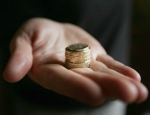 Canny Chancellor co-opts the living wage
Canny Chancellor co-opts the living wage13 July 2015
In this post, Professor Jane Wills considers the implications of the Chanellor's 'co-option' of the living wage.
 Barts Cancer Institute marks 10 years of pioneering work with book launch
Barts Cancer Institute marks 10 years of pioneering work with book launch9 July 2015
Queen Mary University of London’s Barts Cancer Institute (BCI) celebrated its 10 year anniversary with a two day showcase of its research past and present, and launched a commemorative book entitled ‘Every Rational Attempt: The Stories Behind Barts’ Contribution to the Fight Against Cancer’.
 Major new appointment for QMUL’s School of Dentistry
Major new appointment for QMUL’s School of Dentistry7 July 2015
Professor Nikolaos Donos, an internationally renowned clinical academic consultant, has been appointed Head of Clinical Research and Professor of Periodontology and Implant Dentistry at Queen Mary University of London’s School of Dentistry.
 QMUL signs partnership agreement with Northwestern Polytechnical University in Xi’an, China
QMUL signs partnership agreement with Northwestern Polytechnical University in Xi’an, China7 July 2015
As part of Queen Mary University of London’s wider strategy of internationalisation, Professor Simon Gaskell, President and Principal, recently signed a landmark partnership agreement with Professor Wang Jinsong, President of Northwestern Polytechnical University (NPU) during a visit to Xi’an earlier this month.
 School of Physics and Astronomy commended for commitment to gender equality
School of Physics and Astronomy commended for commitment to gender equality6 July 2015
QMUL’s School of Physics and Astronomy has been awarded Juno Champion Status by the Institute of Physics (IOP) in recognition of action they have taken to address the under-representation of women in university physics.
 Students win hackathon by giving air passengers’ spare baggage capacity to charities
Students win hackathon by giving air passengers’ spare baggage capacity to charities6 July 2015
A team of students from QMUL has won the £10,000 grand prize at the Sabre Destination Hack event by developing a prototype system that allows frequent flyers to fill their spare luggage capacity on planes with products that charities need.
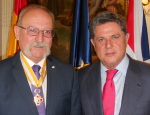 Professor Trevor Dadson honoured by the King of Spain for services to Spanish culture
Professor Trevor Dadson honoured by the King of Spain for services to Spanish culture3 July 2015
Trevor Dadson, Professor of Hispanic Studies at Queen Mary University of London has been awarded the Encomienda de la Orden de Isabel la Católica (Order of Isabella the Catholic) by the King of Spain, Felipe VI.
 EVEL may help set the course for Cameron’s time in office, according to experts at QMUL
EVEL may help set the course for Cameron’s time in office, according to experts at QMUL2 July 2015
The government’s announcement on English Votes for English Laws, while seemingly cautious, “may help set the course for David Cameron’s time in office”, according to Michael Kenny, professor of politics and constitutional expert at Queen Mary University of London.
 Most internet anonymity software leaks users’ details
Most internet anonymity software leaks users’ details29 June 2015
Services used by hundreds of thousands of people in the UK to protect their identity on the web are vulnerable to leaks, according to researchers at QMUL and others.
 Study finds pet owners reluctant to face up to their cats’ kill count
Study finds pet owners reluctant to face up to their cats’ kill count26 June 2015
Cat owners fail to realise the impact of their cat on wildlife according to new research, published today, from QMUL and the University of Exeter.
 Staff and alumni recognised in Queen's birthday honours list 2015
Staff and alumni recognised in Queen's birthday honours list 201524 June 2015
Two academics and three alumni from Queen Mary University of London have been named in the 2015 Queen’s birthday honours. Sir Nicholas Macpherson GCB, Permanent Secretary to HM Treasury and Visiting Professor in the School of Economics and Finance, was appointed Knight Grand Cross of the Order of Bath (GCB) for public service.
 Amrita Ahluwalia to become the next Editor-in-Chief of the British Journal of Pharmacology
Amrita Ahluwalia to become the next Editor-in-Chief of the British Journal of Pharmacology22 June 2015
QMUL is pleased to announce that the next Editor-in-Chief of the British Journal of Pharmacology will be Professor Amrita Ahluwalia, Deputy Director of QMUL’s William Harvey Research Institute.
-150x115.jpg) Showcase of world’s best science teaching arrives at Queen Mary University of London
Showcase of world’s best science teaching arrives at Queen Mary University of London19 June 2015
The Science on Stage Europe festival which brings some of the best science teachers from around the world together to demonstrate their teaching and share ideas is underway at QMUL.

19 June 2015
We all want a quality health service – but what does this really mean? What does quality in healthcare really look like? Dr Deborah Swinglehurst has been exploring this idea for several years, curious to find out what academics, opinion leaders, healthcare professionals and members of the public really understand by the term ‘quality’ in the healthcare context.

19 June 2015
In this article, Professor Julia Hörnle, of QMUL's School of Law, considers the impact and rapid development of face recognition techniques on privacy.
 Adult craze for purchasing human breast milk online poses serious health risks
Adult craze for purchasing human breast milk online poses serious health risks18 June 2015
The recent craze for human breast milk amongst certain fitness communities, fetishists and chronic disease sufferers is potentially dangerous – according to scientists from Queen Mary University of London and published in the Journal of the Royal Society of Medicine.
 New approach to immunosuppression could avoid transplant organ rejection, study finds
New approach to immunosuppression could avoid transplant organ rejection, study finds16 June 2015
A new study has identified how blocking a special set of molecules on the surface of T cells can suppress the heart’s immune response – responsible for transplant rejection and autoimmune diseases such as myocarditis – whilst leaving rest of the body’s immune system intact.

15 June 2015
In this article, Sam Fowles, researcher in international law and politics at Queen Mary University of London, asks whether the European Parliament will 'save us' from the controversial Transatlantic Trade and Investment Partnership (TTIP).
 Study finds just 15 per cent of Tory members will definitely vote to leave the EU
Study finds just 15 per cent of Tory members will definitely vote to leave the EU12 June 2015
Just 15 per cent of Conservative party members would vote for the UK to leave the EU regardless of whatever reforms Prime Minister David Cameron manages to negotiate in the run-up to a referendum.
 QMUL’s Life Sciences Initiative to play important role in Whitechapel rejuvenation
QMUL’s Life Sciences Initiative to play important role in Whitechapel rejuvenation12 June 2015
The changing face of Whitechapel over the coming years was the focus of a Future of London event held at the Blizard Institute on 28 May.
 QMUL launches new educational partnership with University of London Institute in Paris (ULIP)
QMUL launches new educational partnership with University of London Institute in Paris (ULIP)11 June 2015
Queen Mary University of London (QMUL) has announced a new educational partnership with the University of London Institute in Paris (ULIP). The partnership will see the introduction in September 2015 of a new Masters programme in International Relations, based in Paris.
 QMUL appoints new Vice Principal for Science and Engineering
QMUL appoints new Vice Principal for Science and Engineering10 June 2015
Professor Edmund Burke will be QMUL's new Vice Principal (Science and Engineering) from September 2015.
 Simple blood test identifies which patients are prone to serious illness after surgery
Simple blood test identifies which patients are prone to serious illness after surgery7 June 2015
A simple blood test can predict with 90 to 100 per cent accuracy whether a patient is likely to suffer life-threatening complications after major surgery, according to new research from Queen Mary University of London and published in the journal Annals of Surgery.
 ‘Massaging’ mice boosts immune system
‘Massaging’ mice boosts immune system5 June 2015
Massage-like stroking has a positive effect on the immune system of mice by reducing their level of stress.
 QMUL awarded £500k to develop novel dental implant material
QMUL awarded £500k to develop novel dental implant material5 June 2015
Researchers from the School of Dentistry within Queen Mary University of London (QMUL) have received nearly £500k in MRC funding to assess the effectiveness of a new injectable bone graft material used to replace missing bone in implant dentistry.
 Attending breast cancer screening reduces risk of death by 40 per cent
Attending breast cancer screening reduces risk of death by 40 per cent3 June 2015
Women aged 50-69 years who attend mammography screening reduce their risk of dying from breast cancer by 40 per cent compared to women who are not screened – according to a major international review of the latest evidence on breast cancer screening.
 Britain’s oldest tea (and first modern commodity)
Britain’s oldest tea (and first modern commodity)3 June 2015
Dr Richard Coulton, based at QMUL's School of English and Drama, reflects on the discovery of Britain's oldest tea. Dr Coulton is one of three authors of a forthcoming book, Empire of Tea: The Asian Leaf that Conquered the World.

2 June 2015
Professor Peter McOwan, from the School of Electronic Engineering and Computer Science, discusses whether artificial intelligences would actually be able to take over the world, whether they’d want to, and how we'd know if they did.
 Synthetic spider silk could be altered to be stronger or stretchier
Synthetic spider silk could be altered to be stronger or stretchier28 May 2015
After years of research decoding the complex structure and production of spider silk, researchers have now succeeded in producing samples of this exceptionally strong and resilient material in the laboratory. The new development could lead to a variety of biomedical materials — from sutures to scaffolding for organ replacements — made from synthesized silk with properties specifically tuned for their intended uses.
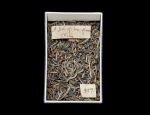 Fancy a 300-year old cuppa? Researchers uncover the oldest tea in Britain
Fancy a 300-year old cuppa? Researchers uncover the oldest tea in Britain27 May 2015
Researchers have found what they believe to be the oldest tea in Britain. The dried green tea was acquired in China, around the year 1700, by ship’s surgeon James Cuninghame, who subsequently gave it as a gift to the famous physician and collector of curiosities, Hans Sloane.
 QMUL PhD student to compete with dance troupe on Britain’s Got Talent
QMUL PhD student to compete with dance troupe on Britain’s Got Talent26 May 2015
Bret Jones, a PhD student in the Department of Drama, will be competing tonight (26 May) in the Britain’s Got Talent live semi-finals with his team’s dance act, Old Men Grooving.
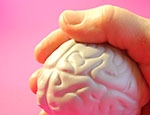 Brain tumour scientists come together to speed up translation of research from lab to clinic
Brain tumour scientists come together to speed up translation of research from lab to clinic21 May 2015
For the first time, leading experts on brain tumours including Professor Silvia Marino from Queen Mary University of London, will share their insights and identify areas of prospective collaboration to speed up the process of translating research findings from laboratory to clinic.
 TTIP and CETA: the trade deals threatening British democracy
TTIP and CETA: the trade deals threatening British democracy21 May 2015
In this post, Sam Fowles, postgraduate research student at QMUL's School of Law, argues that the Transatlantic Trade and Investment Partnership (TTIP) is a threat to British democracy, and should not be ratified.

20 May 2015
Dr Matthias Mauch discusses his recent scientific analysis of the “fossil record” of the Billboard charts prompted widespread attention, particularly the findings about the three musical “revolutions” that shaped the musical landscape of the second half of the 20th century.
 Centre of the Cell is a ‘wonderful emblem of public engagement’ as it celebrates its fifth birthday
Centre of the Cell is a ‘wonderful emblem of public engagement’ as it celebrates its fifth birthday20 May 2015
The Centre of the Cell “is a wonderful emblem of how public engagement is embedded in what this university does,” said QMUL’s Principal, Professor Simon Gaskell, during the science centre’s fifth birthday celebrations.
 Humanitarian crisis affecting Rohingya Muslims is the product of genocide, according to researchers from QMUL
Humanitarian crisis affecting Rohingya Muslims is the product of genocide, according to researchers from QMUL18 May 2015
Persecution of the Rohingya minority by the Myanmar government amounts to genocide, according to field research from the International State Crime Initiative (ISCI), based at Queen Mary University of London.
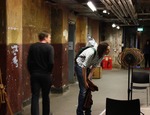 QMUL takes part in Digital Shoreditch Festival 2015
QMUL takes part in Digital Shoreditch Festival 201513 May 2015
PhD students from QMUL’s Media and Arts Technology (MAT) programmes as well as representatives of the School of Law take part in the popular festival.
 Many fixed-dose drug combinations in India lack central regulatory approval
Many fixed-dose drug combinations in India lack central regulatory approval12 May 2015
Fixed-dose drug combinations (FDCs) which have not received central regulatory approval are sold in substantial numbers in India – despite concerns over the safety and efficacy of these combinations – according to new research led by Queen Mary University of London (QMUL) and published in PLOS Medicine.
 Time for binding United Nations rules on violence against women and girls
Time for binding United Nations rules on violence against women and girls12 May 2015
The United Nations must adopt binding international rules to help eliminate violence against women and girls, according to Professor Rashida Manjoo, UN Special Rapporteur on violence against women.
 Individualised approach to merit will not deliver equality in public and working life
Individualised approach to merit will not deliver equality in public and working life6 May 2015
If we want more diversity in our courts, boardrooms, and parliaments, then our individualised approach to merit may “now require quite a serious rethink”, according to Baroness Brenda Hale of Richmond.
 Naked mole-rats anti-cancer gene is unique among mammals
Naked mole-rats anti-cancer gene is unique among mammals5 May 2015
Researchers have found that the gene which gives naked mole-rats’ their natural resistance to cancer is unique among mammals.
 First evolutionary history of 50 years of music charts using big data analysis of sounds
First evolutionary history of 50 years of music charts using big data analysis of sounds5 May 2015
Evolutionary biologists and computer scientists have come together to study the evolution of pop music. Their analysis of 17,000 songs from the US Billboard Hot 100 charts, 1960 to 2010, is the most substantial scientific study of the history of popular music to date.
 Historian uncovers first known photo of Lenin’s 'true love'
Historian uncovers first known photo of Lenin’s 'true love'1 May 2015
A historian from Queen Mary University of London (QMUL) has uncovered the first confirmed image of Apollinariya Yakubova, considered by many to be the true love of Vladimir Lenin. Dr Robert Henderson, honorary research associate at QMUL’s School of History, discovered the photograph in the State Archive of the Russian Federation, while researching for his forthcoming book on the Russian revolutionary V. L. Burtsev.
 HRH The Princess Royal officially opens QMUL’s new Dental School
HRH The Princess Royal officially opens QMUL’s new Dental School30 April 2015
It was all smiles in Whitechapel today as Her Royal Highness The Princess Royal gave Queen Mary University of London’s new Dental School, embedded within The Royal London Dental Hospital, the royal seal of approval.
 Screening for HIV in GP surgeries leads to increased and earlier diagnosis
Screening for HIV in GP surgeries leads to increased and earlier diagnosis29 April 2015
Training general practices to offer rapid HIV tests leads to increased detection and earlier diagnosis of patients with HIV infection – according to a new study led by Queen Mary University of London (QMUL) and published in The Lancet HIV.
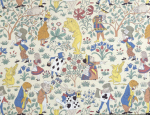 Dressing down the rabbit hole – how to become Alice in Wonderland
Dressing down the rabbit hole – how to become Alice in Wonderland29 April 2015
From 2 May to 9 November, QMUL's Dr Kiera Vaclavik will curate 'The Alice Look', an exhibition at the V&A Museum of Childhood. In this article, Dr Vaclavik considers the impact of Lewis Carroll's famous heroine on the way that we dress.
 QMUL student wins Languages Undergraduate of the Year prize
QMUL student wins Languages Undergraduate of the Year prize29 April 2015
A QMUL student who can speak five different languages has won a Languages Undergraduate of the Year Award.
 Queen Mary University of London climbs QS World Rankings
Queen Mary University of London climbs QS World Rankings29 April 2015
Three subject areas at QMUL are now among the top 50 in the world, according to a highly-regarded analysis of more than 3,400 universities.
 Showcase of QMUL electronic engineering and computer science
Showcase of QMUL electronic engineering and computer science28 April 2015
Researchers from QMUL’s School of Electronic Engineering and Computer Science (EECS) presented some their research to colleagues and visitors at the Mile End Campus.
 Centre for Research in Equality and Diversity (CRED) celebrates ten years at QMUL
Centre for Research in Equality and Diversity (CRED) celebrates ten years at QMUL28 April 2015
Despite the appearance of great strides forward; discrimination, inequality, and exclusion persist in developed societies and workplaces. The nature of that persistence – and the manner in which discrimination has, in many cases, become more insidious – was the subject of the 2015 annual lecture from QMUL’s Centre for Research in Equality and Diversity.
 Bumblebees use nicotine to fight off parasites
Bumblebees use nicotine to fight off parasites27 April 2015
Bumblebees that have been infected by parasites seek out flowers with nicotine in the nectar, likely to fight off the infection, new research has found. The nicotine appears to slow the progression of disease in infected bees but has harmful effects when consumed by healthy bees.
 QMUL’s School of Medicine awarded Silver Athena SWAN
QMUL’s School of Medicine awarded Silver Athena SWAN27 April 2015
The School of Medicine within Queen Mary University of London (QMUL) is the recipient of a silver level award in the latest round of the Athena SWAN Charter awards.

27 April 2015
On 24 April 2015, QMUL's Centre for Commercial Law Studies convened a group of legal experts to consider and examine issues around gaming an intellectual property law. In this article, Dr Gaetano Dimita, Lecturer in International Intellectual Property Law, sets out the many legal challenges that emerge from this growing and dynamic sector.
 QMUL researcher wins award for work on psychiatric diseases
QMUL researcher wins award for work on psychiatric diseases24 April 2015
A post-doctoral researcher from Queen Mary University of London has won a prestigious €1,000 prize for her work on psychiatric diseases.
 Reducing big data using ideas from quantum theory makes it easier to interpret
Reducing big data using ideas from quantum theory makes it easier to interpret23 April 2015
A new technique of visualising the complicated relationships between anything from Facebook users to proteins in a cell via countries’ importing and exporting food provides a simpler and cheaper method of making sense of large volumes of data.

23 April 2015
Dr Magda Osman, Senior Lecturer in Experimental Cognitive Psychology explores the research behind behavioural economics and looks at its relationship with advertising
 Scientists discover genetic cause of deadly rare disease ‘dyskeratosis congenita’
Scientists discover genetic cause of deadly rare disease ‘dyskeratosis congenita’23 April 2015
Researchers from Queen Mary University of London have uncovered a genetic defect which causes the life-threatening condition ‘dyskeratosis congenita’ (DC) – a rare genetic form of bone marrow failure.
23 April 2015
Sarah Wolff, Lecturer at QMUL's School of Politics and International Relations, examines the tragic events in the Mediterranean and outlines what she describes as failed EU policy in the area of migration.
 Concerns over UK government plan to increase participation in school rugby
Concerns over UK government plan to increase participation in school rugby22 April 2015
Government plans to increase participation in rugby within schools fail to take into account data on the serious levels of school rugby-related injury and are happening in the absence of systems for injury surveillance and prevention – according to experts from Queen Mary University of London (QMUL) and published in the BMJ.
 QMUL law student develops digital receipt app
QMUL law student develops digital receipt app22 April 2015
Fed up with keeping paper receipts a QMUL law student has developed an app which stores them electronically.
 Proteins that control anxiety in humans and cause insects to shed their skins have common origin
Proteins that control anxiety in humans and cause insects to shed their skins have common origin21 April 2015
Researchers have discovered that a protein which controls anxiety in humans has the same molecular ancestor as one which causes insects to moult when they outgrow their skins. Studies on sea urchins provided the missing link because they have a protein with elements common to those in both humans and insects and reveal a common ancestry hundreds of millions of years ago.
 QMUL launches new website for trauma survivors
QMUL launches new website for trauma survivors21 April 2015
Queen Mary University of London’s Barts Centre for Trauma Sciences (C4TS) has today launched the new website Aftertrauma.org, the UK’s most comprehensive online resource dedicated to helping trauma survivors – and their families, friends and carers – on their long and complex recovery journey.
 Bottom 50 per cent of UK authors made less than £10,500 in 2013
Bottom 50 per cent of UK authors made less than £10,500 in 201321 April 2015
The median earnings of authors in the UK has fallen below the minimum wage, according to a survey of 2,500 writers, published by researchers at Queen Mary University of London.
 New research gives clues as to why older people get more tendon injuries
New research gives clues as to why older people get more tendon injuries20 April 2015
New research into how tendons age has found that the material between tendon fibre bundles stiffens as it gets older and that this is responsible for older people being more susceptible to tendon injuries.
 QMUL marks 100,000 visitors to science education pod ‘Centre of the Cell’
QMUL marks 100,000 visitors to science education pod ‘Centre of the Cell’20 April 2015
Queen Mary University of London’s life sciences education programme, Centre of the Cell, celebrated its 100,000th participants after a visit from a Tower Hamlets primary school class on Friday 17 April 2015.
 Scientists discover protein that boosts immunity to viruses and cancer
Scientists discover protein that boosts immunity to viruses and cancer16 April 2015
Scientists have discovered a protein that strongly promotes immunity to viruses and cancer, opening the door to new therapies in the future.
 Charity which works closely with Queen Mary University of London awarded for employer engagement
Charity which works closely with Queen Mary University of London awarded for employer engagement10 April 2015
An education charity which 40 QMUL students have volunteered for has scooped a prestigious employer engagement award.
 New evidence that tyrannosaurs fought and ate each other
New evidence that tyrannosaurs fought and ate each other9 April 2015
Examination of a Daspletosaurus skull by Dr David Hone of the School of Biological and Chemical Sciences found signs that it had been bitten by another tyrannosaur during its lifetime as well as after it had died.
 Researchers at Queen Mary University of London launch app to match voters with parties
Researchers at Queen Mary University of London launch app to match voters with parties8 April 2015
Political scientists at Queen Mary University of London (QMUL) have launched a new voting advice application to match voters with the party that best represents their views. More than 20,000 people have used the app since it went live on 1 April.
-150.jpg) Bumblebees differentiate flower types when arranged horizontally but not vertically
Bumblebees differentiate flower types when arranged horizontally but not vertically7 April 2015
Bumblebees trained to go to feeders labelled with a certain colour or pattern cue but avoid differently labelled alternative feeders did so when feeders were arranged horizontally but didn’t when arranged vertically. Researchers believe this could be because groups of flowers arranged horizontally, like those in a meadow, often include several different species, while those arranged vertically, like in blossoming trees are likely to all be the same species.
 QMUL physicists prepare for new data as Large Hadron Collider restarts
QMUL physicists prepare for new data as Large Hadron Collider restarts7 April 2015
Physicists from QMUL, members of the ATLAS experiment and participants in the 2012 discovery of the Higgs boson particle, are gearing up to analyse new data from the Large Hadron Collider.
 New Vice-Principal appointed by Queen Mary University of London
New Vice-Principal appointed by Queen Mary University of London7 April 2015
Professor Rebecca Lingwood has been appointed as QMUL’s new Vice-Principal for Student Experience, Teaching and Learning.
 EECS PhD students win sustainable communities hackathon
EECS PhD students win sustainable communities hackathon2 April 2015
An interdisciplinary team of five students from QMUL’s PhD programme in the School of Electrical Engineering and Computer Science will travel to Mumbai to present their ideas after winning a competition to design a system that integrated plants and social media to promote sustainable communities.
 Exhibition of 100 images to celebrate life on East London’s Becontree Estate
Exhibition of 100 images to celebrate life on East London’s Becontree Estate2 April 2015An exhibition of 100 images, produced by renowned artists in partnership with residents from Becontree Estate in East London, will open in Dagenham Library on Friday 10 April. The images celebrate the extraordinary stories of life on what began as the world’s largest housing estate.
 Legal stars of the future compete in annual QMUL ‘George Hinde Moot’
Legal stars of the future compete in annual QMUL ‘George Hinde Moot’2 April 2015
The quality of contributions from finalists in the annual QMUL mooting competition was “nothing short of astonishing”, according to Sir Christopher (Lord Justice) Pitchford, who judged the final at Queen Mary University of London on 24 March.
 QMUL selected to be part of new genomics training programme for NHS professionals
QMUL selected to be part of new genomics training programme for NHS professionals1 April 2015
Queen Mary University of London (QMUL) is delighted to announce it has been selected by Health Education England to be part of a cutting- edge new training programme in genomics for healthcare professionals across the country.
 Racial income inequality reduces levels of trust and social capital in communities
Racial income inequality reduces levels of trust and social capital in communities30 March 2015
In recent decades, commentators and academics have become increasingly concerned over the decline in both trust and social capital in many communities in the United States. While research has shown that race and income diversity tends to be associated with lower levels of social capital, Andrea Tesei takes a closer look, examining the relationship between trust, income inequality and racial diversity.

25 March 2015
Jessica Jacobs, Research Fellow at QMUL's School of Geography, argues that the systematic neglect of border regions by military-backed governments in the Middle East has enabled the success of extreme terrorist groups in these marginalised areas, resulting in "geographies of hate".
 Ed Miliband’s route to 10 Downing Street may hinge on the performance of Ukip, says Professor Tim Bale
Ed Miliband’s route to 10 Downing Street may hinge on the performance of Ukip, says Professor Tim Bale25 March 2015
The fortunes of Ed Miliband and the Labour Party may well depend on the performance of Ukip on 7 May, according to Professor Tim Bale, who was speaking at the launch of his new book: Five Year Mission – The Labour Party under Ed Miliband.

24 March 2015
In an article which originally appeared on The Conversation, Dr Tom Whyntie explains how the world's largest distributed computer grid helped find the Higgs boson and what it'll be doing as the Large Hadron Collider is started up again.

23 March 2015
On the one year anniversary of the Ebola outbreak, Dr Sophie Harman - Reader in International Relations at QMUL - explores the devastating impact on women in affected regions.

19 March 2015
At least 19 people died in a terrorist attack in Tunisia on 18 March 2015. In this article, Dr Sarah Wolff - Lecturer, School of Politics and International Relations - considers the implications for Tunisia "beyond the immediate horror" of the attack, and describes it as "a litmus test for the country’s democratic transition".
 Queen Mary University of London launches Medical School in Malta
Queen Mary University of London launches Medical School in Malta18 March 2015
Queen Mary University of London (QMUL) is to launch a new Medical School in the Republic of Malta.
 QMUL and Norton Rose Fulbright LLP announce new Energy scholarship programme
QMUL and Norton Rose Fulbright LLP announce new Energy scholarship programme18 March 2015
The Centre for Commercial Law Studies (CCLS) at Queen Mary University of London has announced details of a scholarship and internship programme with legal practice Norton Rose Fulbright LLP.
 World’s largest community genetics study launches in East London
World’s largest community genetics study launches in East London13 March 2015
East London Genes & Health, the world’s largest community based genetics study, has launched today – aiming to improve health among people of Pakistani and Bangladeshi heritage in East London by analysing the genes and health of 100,000 local people.
 Researchers display their innovations at Wearable Technology Show
Researchers display their innovations at Wearable Technology Show12 March 2015
Wearable technologies, including a bag that tracks what’s in it, a jacket that helps people make introductions and a necklace that connects people in long-distance relationships, are among innovations being demonstrated by QMUL researchers at the Wearable Technology Show 2015.
 CARDIS, a new European effort targeting mobile early-stage cardio vascular disease detection
CARDIS, a new European effort targeting mobile early-stage cardio vascular disease detection12 March 2015
QMUL has partnered with imec, Medtronic, Ghent University and others to launch the CARDIS project. Together they will develop and validate an early-stage cardiovascular disease detection platform using integrated silicon photonics.
 QMUL and Bank of England to shine a light on the financing of Britain’s WWI war effort
QMUL and Bank of England to shine a light on the financing of Britain’s WWI war effort9 March 2015
Researchers at Queen Mary University of London (QMUL) have been granted special access to war bond ledgers, held at the Bank of England, which list those who helped to bankroll Britain’s war effort from 1914-1918.
 Dr Shahidha Bari awarded prestigious prize for arts journalism
Dr Shahidha Bari awarded prestigious prize for arts journalism9 March 2015
Dr Shahidha Bari, Lecturer in Romanticism at Queen Mary University of London, has won the Observer / Anthony Burgess Prize for Arts Journalism. Now in its third year, the £2000 prize is for “previously unpublished, imaginative, original, and thought-provoking” works.
 ‘Habitable’ planet GJ 581d previously dismissed as noise probably does exist
‘Habitable’ planet GJ 581d previously dismissed as noise probably does exist6 March 2015
A report published in Science has dismissed claims made last year that the first super-Earth planet discovered in the habitable zone of a distant star was ‘stellar activity masquerading as planets’.
 New findings on ‘key players’ in brain inflammation
New findings on ‘key players’ in brain inflammation6 March 2015
Inflammation is the immune system’s natural reaction to an ‘aggressor’ in the body or an injury, but if the inflammatory response is too strong it becomes harmful. For example, inflammation in the brain occurs when a person has a stroke, or when suffering from neurological diseases such as Alzheimer’s and Parkinson’s.
 QMUL supports Innovate UK wearables challenge
QMUL supports Innovate UK wearables challenge4 March 2015
The Innovate UK IC Tomorrow competition is offering up to £35,000 to small companies to work with expert partners, including QMUL, to find solutions to challenges in the wearable technologies market.
 Global health systems neglect treating three billion people with tooth decay
Global health systems neglect treating three billion people with tooth decay4 March 2015
Billions of people across the globe are suffering the consequences of untreated tooth decay (cavities) – which include toothache and dental abscesses – according to new research published in the Journal of Dental Research.
 Report on impact of terrorist listing launched at QMUL
Report on impact of terrorist listing launched at QMUL4 March 2015
A major report into terrorist listing and conflict transformation was launched at an event at QMUL’s School of Law by the International State Crime Initiative (ISCI).
 Future of the UK hangs in the balance, according to experts at Mile End Institute launch event
Future of the UK hangs in the balance, according to experts at Mile End Institute launch event4 March 2015
The United Kingdom as we know it may not survive the next decade and is “no longer a fixed map in the collective UK mind”, according to Lord Professor Peter Hennessy, who was speaking at the launch of the Mile End Institute (MEI), at Queen Mary University of London on 2 March.
 Should Shakespeare be censored for sensitive times?
Should Shakespeare be censored for sensitive times?4 March 2015
Should the works of Shakespeare’s plays be censored where there is a risk of offence? In this article, Dr Preti Taneja, Global Shakespeare Research Fellow, considers the issues.
 QMUL Drama student has song chosen for BBC Radio 1 playlist
QMUL Drama student has song chosen for BBC Radio 1 playlist3 March 2015
A final year Drama student at QMUL has had her song selected for the BBC Radio 1 playlist.
 Bees form false memories just like humans
Bees form false memories just like humans27 February 2015
In the same way that humans sometimes remember things that didn’t actually occur, researchers have found that bees also misremember. False memories have never been observed in non-human animals before.
 Global health experts call into question sub-Saharan cancer data
Global health experts call into question sub-Saharan cancer data27 February 2015
Global health experts believe the current data on cancer prevalence, incidence and mortality in sub-Saharan Africa – which determines how billions of pounds of international development money is spent – are weak and could mean vital funds are being deflected from other priorities. These include diarrhoeal and waterborne diseases, malnutrition, sanitation and the need to strengthen health systems.
 The economic consequences of the Greek crisis
The economic consequences of the Greek crisis27 February 2015
In this article, co-author Professor Brigitte Granville - School of Business and Management at QMUL - contends that default and exit from the eurozone would allow Greece to begin correcting past mistakes, and put its economy on the path to recovery and sustainable growth.

26 February 2015
Professor Norman Fenton writes about his role co-presenting a forthcoming BBC Four documentary on climate change and the importance of three key statistics.
 QMUL announces new MSc partnership with Kew
QMUL announces new MSc partnership with Kew26 February 2015
From September 2015 QMUL will be offering a new MSc Plant and Fungal Taxonomy, Diversity and Conservation in collaboration with the Royal Botanic Gardens at Kew.
 QMUL retained as one of 11 UK universities recognised for Singapore Bar
QMUL retained as one of 11 UK universities recognised for Singapore Bar26 February 2015
QMUL’s School of Law is now one of only 11 UK university law departments recognised for purposes of admission to the Singapore Bar.

25 February 2015
In this blog post, QMUL Lecturer in Digital Media Bob L. Sturm discusses how, like 'Clever Hans' the German horse who appeared to be able to do complex mathematics, music listening programs can appear to work until we start to really test them.
 Multiple sclerosis teacher at QMUL to appear on Comic Relief’s Strictly Come Dancing
Multiple sclerosis teacher at QMUL to appear on Comic Relief’s Strictly Come Dancing25 February 2015
A person with MS who works with QMUL to talk about her experience of the condition has been selected to appear in a special Comic Relief edition of Strictly Come Dancing.

23 February 2015
In this letter, published in the Law Society Gazette, QMUL's Jonathan Griffiths challenges "undue pessimism" about the UK’s imminent legislation on plain packaging.
 QMUL Historian Amanda Vickery presents BBC series on the suffragettes
QMUL Historian Amanda Vickery presents BBC series on the suffragettes23 February 2015
Oppression, discrimination, and the unrelenting courage of forgotten heroines. In a major new series for the BBC, renowned historian Professor Amanda Vickery tells the story of Britain’s longest war; the suffragettes’ 300 year-long campaign for equality.
 New QMUL app uses Twitter comments to give real-time film reviews
New QMUL app uses Twitter comments to give real-time film reviews20 February 2015
A new app, called Reel Reviews, which uses sophisticated computer analysis of comments from users on Twitter to give up-to-the-minute film ratings has been launched just in time for the Oscars.
 QMUL and Takeda announce research collaboration to develop new therapies in gastroenterology
QMUL and Takeda announce research collaboration to develop new therapies in gastroenterology20 February 2015
Queen Mary University of London (QMUL) and Takeda Pharmaceutical Company Limited today announced a major research collaboration aiming to define new insights and develop novel therapies in gastroenterology.
 Cheap solar cells made from shrimp shells
Cheap solar cells made from shrimp shells19 February 2015
Researchers at QMUL have successfully created electricity-generating solar-cells with chemicals found in the shells of shrimps and other crustaceans for the first time.
 New HPV vaccine offers greater protection against cervical cancer than current vaccine
New HPV vaccine offers greater protection against cervical cancer than current vaccine18 February 2015
Scientists have developed a new HPV (human papilloma virus) vaccine which protects against nine types of the virus – seven of which cause most cases of cervical cancer. The new vaccine offers significantly greater protection than the current vaccine, which protects against only two cancer causing types of HPV.

18 February 2015
In this article, Professor Julia Hörnle - one of the UK's leading experts in online dispute resolution - comments on the recent recommendations from Civil Justice Council's report on ODR. The group, of which Julia is a member, calls for a radical shake-up in how the UK handles low value claims.
 QMUL student shortlisted for national volunteering award
QMUL student shortlisted for national volunteering award18 February 2015
A Queen Mary University of London (QMUL) medicine student has been shortlisted for a national volunteering award after creating a project to help chronically ill young children.
 Report calls for radical overhaul of how the court service handles low value claims
Report calls for radical overhaul of how the court service handles low value claims16 February 2015
A new system of online justice would revolutionise the court system of England and Wales, according to a report from the Civil Justice Council’s Online Dispute Resolution Advisory Group. The group includes Julia Hörnle, Professor in Internet Law at QMUL.
 Changing stem cell structure may help fight obesity
Changing stem cell structure may help fight obesity16 February 2015
Scientists have found that reducing the size of tiny hair like structures on stem cells stops them turning into fat. The discovery could be used to develop a way of preventing obesity.
 Cold-blooded animals grow bigger in the warm on land, but smaller in warm water
Cold-blooded animals grow bigger in the warm on land, but smaller in warm water16 February 2015
Scientists studying arthropods, the group of cold-blooded animals that includes crabs and insects, have found that individuals within species living on land tend to grow to a larger size in the warm and nearer the equator, but that the reverse is true of species found in water.
 QMUL Professor collaborates on Singapore music and mathematics conference
QMUL Professor collaborates on Singapore music and mathematics conference13 February 2015
Professor Elaine Chew from QMUL’s Centre for Digital Music is invited convener of, and speaker and performer at, a unique international workshop to be hosted at the Yong Siew Toh Conservatory of Music in Singapore.
 Scientists tackle issue of how to get a first date in a digital world
Scientists tackle issue of how to get a first date in a digital world13 February 2015
An online profile name beginning with letters A-M is as important as an attractive photo and fluent headline when it comes to being successful in the world of online dating, according to scientists.
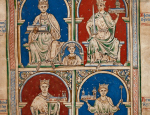 New book from acclaimed QMUL historian Dr Thomas Asbridge tells the story of the greatest knight
New book from acclaimed QMUL historian Dr Thomas Asbridge tells the story of the greatest knight13 February 2015
A new book from QMUL historian Dr Thomas Asbridge tells the story of one remarkable man, the birth of the knightly class to which he belonged, and the forging of the English nation.
 QMUL supports Boris Johnson trade mission to US
QMUL supports Boris Johnson trade mission to US12 February 2015
Queen Mary University of London (QMUL) has produced a short film to support Boris Johnson’s trade mission to America to promote London as a world class study destination.
 Centre of the Cell hosts half-term science fun
Centre of the Cell hosts half-term science fun12 February 2015
100-year-old killer diseases and an interactive show about the heart come to Centre of the Cell, QMUL’s science education pod in Whitechapel, this half-term.
 ‘Stressed’ young bees could be the cause of colony collapse
‘Stressed’ young bees could be the cause of colony collapse9 February 2015
Pressure on young bees to grow up too fast could be a major factor in explaining the disastrous declines in bee populations seen worldwide.
 QMUL PhD student exhibits tactile music chair for deaf people
QMUL PhD student exhibits tactile music chair for deaf people6 February 2015
Robert Jack, a PhD student on the Media and Arts Technology programme at QMUL took his audio tactile furniture to the Incloodu Deaf Arts Festival.
 UK Judge on European Court of Human Rights says Court must change to remain effective
UK Judge on European Court of Human Rights says Court must change to remain effective6 February 2015
The European Court of Human Rights (ECHR) must continue to change if it is to remain effective, according to Judge Paul Mahoney, the UK Judge on the ECHR. Judge Mahoney was speaking at an event organised by the Human Rights Collegium at Queen Mary University of London.

6 February 2015
In a recent study Dianna Smith and Graham Kirkwood, of QMUL’s Blizard Institute, found there were more childhood injuries in areas of deprivation but, they write, with a thorough recording process better prevention can take place.
 Get involved with Green Mary Week
Get involved with Green Mary Week6 February 2015
We could all be a little bit greener and next week should be the perfect opportunity to start.
 New research reveals one in two people in the UK will get cancer
New research reveals one in two people in the UK will get cancer5 February 2015
New research has predicted one in two people in the UK will develop cancer at some point in their lives, according to the most accurate forecast to date from Queen Mary University of London and Cancer Research UK.
 New research reveals one in two people in the UK will get cancer
New research reveals one in two people in the UK will get cancer4 February 2015
New research has predicted one in two people in the UK will develop cancer at some point in their lives, according to the most accurate forecast to date from Queen Mary University of London and Cancer Research UK.
 QMUL and UCL agree to establish new institute to tackle cardiovascular disease
QMUL and UCL agree to establish new institute to tackle cardiovascular disease4 February 2015
Queen Mary University of London and UCL have agreed to establish a joint Cardiovascular Institute to rise to the global challenge of cardiovascular disease.
 New initiative from QMUL offers free legal advice to victims of revenge porn
New initiative from QMUL offers free legal advice to victims of revenge porn3 February 2015
Victims of revenge porn can apply for free legal advice through a new service offered by the School of Law at Queen Mary University of London (QMUL). As part of the service, victims will receive legal advice from a team of trained student advisors – under the supervision of experienced, qualified lawyers - at QMUL’s Legal Advice Centre.
 Students raise nearly £50,000 for charity
Students raise nearly £50,000 for charity3 February 2015
QMUL students raised a remarkable £46,779.44 for the international charity Islamic Relief.
 Tropical wasps attack intruders with unfamiliar faces
Tropical wasps attack intruders with unfamiliar faces2 February 2015
Researchers at QMUL in collaboration with the University of Florence, have discovered that a species of tropical wasps can memorise the faces of members of their colony and will attack any individual with an unfamiliar face. These wasps can also recognise the smell of their nest-mates, but pay more attention to the unique facial patterns in their species when considering whether an individual is friend or foe.
 QMUL ranked as one of the top 20 most international universities in the world
QMUL ranked as one of the top 20 most international universities in the world2 February 2015
Queen Mary University of London has been ranked as the 20th most internationally diverse university in the world, according to a list published by the Times Higher Education (THE).
 Dr Helen McCarthy wins award for International Affairs Book of the Year
Dr Helen McCarthy wins award for International Affairs Book of the Year30 January 2015
Women of the World: The Rise of the Female Diplomat, by QMUL Historian Dr Helen McCarthy, took the prize for International Affairs Book of the Year at the Political Book Awards 2015.
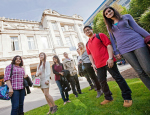 Surge in undergraduate applications to QMUL as our university remains a popular choice
Surge in undergraduate applications to QMUL as our university remains a popular choice30 January 2015
Congratulations to those who have received an offer to study at Queen Mary University of London (QMUL) for 2015-entry as the university recorded yet another year of increased numbers of UCAS applications.
 ‘Nudge’ psychology is not based on robust evidence and conscious decision-making is more effective
‘Nudge’ psychology is not based on robust evidence and conscious decision-making is more effective28 January 2015
A new study says that the kind of instinctive decision-making advocated in best-selling popular psychology books like ‘Nudge’, ‘Thinking Fast and Slow’ and ‘Blink’ is not backed up by reliable evidence.
 Revolutionary device found to lower blood pressure
Revolutionary device found to lower blood pressure23 January 2015
A revolutionary device has been shown to significantly lower blood pressure among patients with uncontrolled high blood pressure, compared to those treated with usual drug measures – according to research from Queen Mary University of London and published in The Lancet.
 British voters open to a Jewish prime minister — but some are more welcoming than others
British voters open to a Jewish prime minister — but some are more welcoming than others23 January 2015
In this post, Professor Tim Bale of QMUL's School of Politics and International Relations, discusses the findings of new polling data on attitudes to Jewish political leaders. The data is based on research from Professor Bale's forthcoming book: Five Year Mission: The Labour Party under Ed Miliband.
 New ‘microcapsules’ have potential to repair damage caused by osteoarthritis
New ‘microcapsules’ have potential to repair damage caused by osteoarthritis21 January 2015
A new ‘microcapsule’ treatment delivery method developed by researchers at Queen Mary University of London (QMUL) could reduce inflammation in cartilage affected by osteoarthritis and reverse damage to tissue. The research was funded by Arthritis Research UK and the AO Foundation.
 Syriza lead the polls in Greece but coalition options remain unclear
Syriza lead the polls in Greece but coalition options remain unclear20 January 2015
Greece will hold parliamentary elections on 25 January. Ahead of the vote, Dr Stella Ladi writes on the state of play in the Greek party system. She notes that while the radical left party Syriza currently enjoys a lead in the polls, there is debate over who its most likely coalition partners would be should it fail to secure a majority.
 Energy companies must repair relationship with society, says former CEO of BP
Energy companies must repair relationship with society, says former CEO of BP20 January 2015
Businesses and extractive industries should communicate openly and engage more effectively with society, according to the former CEO of British Petroleum (BP), who was speaking at the launch of QMUL’s Energy and Natural Resources Law Institute.
 Daily beetroot juice lowers blood pressure, scientists find
Daily beetroot juice lowers blood pressure, scientists find19 January 2015
Drinking a daily cup of beetroot juice has been shown to significantly lower blood pressure among patients with high blood pressure, according to scientists from Queen Mary University of London.
 QMUL backed model-building game Sodaconstructor launches Kickstarter
QMUL backed model-building game Sodaconstructor launches Kickstarter15 January 2015
BAFTA-winning physics-based model building game Sodaconstructor has launched a Kickstarter to bring the constructor experience to a new generation through mobile.
 Hope for muscular dystrophy patients: harnessing gene helps repair muscle damage
Hope for muscular dystrophy patients: harnessing gene helps repair muscle damage15 January 2015
Researchers have successfully improved the ability of muscle to repair itself – by artificially increasing levels of the BMI1 gene in the muscle-specific stem cells of mice with muscular dystrophy.
 Cretaceous carnivore arrives at Queen Mary University of London
Cretaceous carnivore arrives at Queen Mary University of London15 January 2015
Queen Mary University of London (QMUL) has taken delivery of a life-sized cast of a Tyrannosaurus rex skull that will be used for school visits, public engagement and outreach.
 Testing for Bovine Tuberculosis is more effective than badger culls at controlling the disease
Testing for Bovine Tuberculosis is more effective than badger culls at controlling the disease14 January 2015
Modelling produced by researchers at Queen Mary University of London (QMUL) has found that the only effective potential Bovine Tuberculosis (TB) control strategies are badger culling, cattle testing, controlling cattle movement, and ceasing the practice of housing farm cattle together during winter.
 QMUL researchers awarded £1.4m from charity Leukaemia and Lymphoma Research
QMUL researchers awarded £1.4m from charity Leukaemia and Lymphoma Research13 January 2015
Scientists from Queen Mary University of London (QMUL) have been awarded a Specialist Programme Grant of £1.4 million from the charity Leukaemia & Lymphoma Research. The programme aims to uncover the cause(s) of familial leukaemia and myelodysplasia–blood disorders that cause a life threatening drop in the number of healthy blood cells – and will begin in April 2015.
 QMUL Mile End Institute to launch with a debate on the future of the United Kingdom
QMUL Mile End Institute to launch with a debate on the future of the United Kingdom12 January 2015
Can the United Kingdom survive without changing its constitution? This critical question will be posed to a high-profile panel of commentators and politicians on Monday 2 March, at the launch of the QMUL Mile End Institute.

7 January 2015
Professor Norman Williams of Queen Mary University of London has been awarded a knighthood in the 2015 New Year’s Honours for services to surgery.
 Torture Allegations, Racial Conflicts…and Leadership on Human Rights?
Torture Allegations, Racial Conflicts…and Leadership on Human Rights?2 January 2015
In this article, Professor Eric Heinze of QMUL's School of Law, argues that the United States, whose government has "has committed grave violations" in the area of human rights, has placed its leadership role in question.